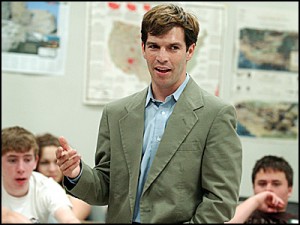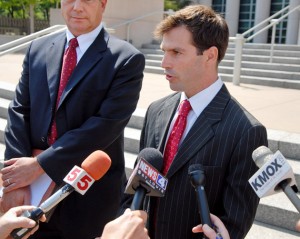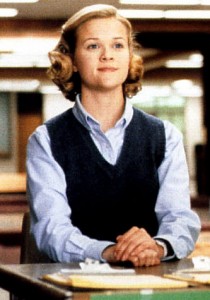Last weekend, on my last day in St. Louis before moving to NYC, I co-hosted a free 3-on-3 basketball tournament and community fair in North St. Louis. The event is in its sixth year; I started it during my first state Senate campaign in 2006, and it eventually attracted several thousand people each year. Dozens of businesses sponsor the event, which features a traveling health clinic, free school supplies, and brand-new bicycles and iPods for the winning teams in each age group.
North St. Louis is struggling. It’s about 95% black, and unemployment among men in their 20s approaches 50% in many neighborhoods. Parts of it resemble the Detroit that you see on the news or the Baltimore on The Wire, but people forget that families live there. It’s a community fighting to regain its lost glory – ironically, the days of segregation, when black doctors, lawyers, teachers, principals, and morticians lived among the laborers and housekeepers, in larger homes but in close proximity.
The first couple years of the tournament, people weren’t sure about me. Who is this white guy coming up in our neighborhood? Just another politician sniffing around for votes, making more promises? Using us for a photo-op? Well, he can dribble…but we’ve been fooled before. Remember that Schoemehl boy, when he first ran for Mayor…then turned around and closed City Hospital?
The next few years, people began to see that my commitment was genuine. As the group of city charter schools I’d co-founded a decade earlier grew to 3000 students, people noted my involvement. Others saw the legislative work I did on behalf of incarcerated fathers struggling to pay child support.
Last year, I missed the tournament, because I was locked up myself. Sadly, nothing built my street cred with the tournament participants like that. This year, a dozen different guys approached me to talk about the experience. Not surprisingly (given their distrust of the feds and disdain of snitches), they sneered at my prosecutor and my co-conspirators who received probation. Most of them had been incarcerated before and were out of work. They asked what I was up to now, and I told them with a mix of pride and embarrassment about the professorship for which I was leaving town. Pride that I was back on my feet; embarrassment that – relative to them – my education afforded me so many options. Several asked if I could help them find work. I’m trying, but it is not always easy for an ex-felon to help other ex-felons find work.
Prison was not exotic to them. Their faces did not betray a morbid fascination, as nearly everyone else’s did, about whether I had been raped in prison. They did not judge me for my crime. They thanked me for my work in the community, and asked me to stay involved, or to run for mayor.
One of my teammates this year was a 20-year old I met five years ago when he was crashing with friends because of a very troubled family life. He is now preparing to study in England for a year. I had a small role in his surmounting of incredibly long odds, and when he thanked me for that and asked if I would be back to play in the tournament next year, I realized how many people I loved I would be leaving behind.
***
The response of other St. Louisans to my experience has been more varied. Most of my close friends, black and white, remained close, and I will never, ever forget their friendship and support. Outside of that group, I know that many people were angry at me for having lied to the feds. Others were disappointed at the premature end to a promising political career. Some were delighted at the premature end to a promising political career.
The only problem is trying to figure out which people feel which way.
Starting on the morning of my resignation and guilty plea, I did not contact anyone who did not contact me first. That way I wouldn’t risk bothering anyone who no longer wanted to have anything to do with me. I never again heard from 90% of the 8,000+ people in my phone contacts. All those people who just had to get a hold of me a few weeks earlier about matters that had been so urgent…
But whenever I went out in public I ran into old friends, supporters, and associates who hadn’t reached out to me. I never knew where I stood with them. Were they glad to see me or furious at my recklessness, angry that they’d wasted time or money on me? Crestfallen over my deceit after my service as a good government progressive? Disillusioned because they had to explain to their children what I did? Or were they fuming at the prosecutor for pursuing the case, or at my close friend for wearing a wire, or at the political system for propping up dynasties and tilting the playing field against insurgent candidates so dramatically that we felt forced to resort to last-minute illicit campaigning?
Not knowing the answer to these questions, dozens of times a day, was stressful, occasionally exhausting.
Had I known what to expect from each person, it would’ve been fine – even if every single person was furious. Indeed, I sometimes dealt with anger better than I dealt with sympathy; I quietly seethed when a well-intentioned neighbor found out I was moving to NYC and said patronizingly, “That’s really great – a fresh start!”
***
At the end of the film “Election”, disgraced civics teacher Jim McAlister (Matthew Broderick) leaves the Midwest to fulfill a longtime dream of moving to New York City, where he becomes a tour guide at the American Museum of Natural History. McAlister had been forced from his teaching position after using his position as student council adviser to improperly influence an election.
In some respects, the parallels are uncanny. But unlike Mr. M., who left Omaha divorced and humiliated, I leave St. Louis on my own terms, with a loving wife and a baby to come later this month, to accept a professorship in the public policy graduate program at The New School in Manhattan. I leave because I love to teach, and because I’ll get to teach in a very applied program, which suits my approach of bringing real-world experiences into the classroom and employing experiential learning methods. I leave with an abiding love for the people and neighborhoods of St. Louis, one that only deepened this past year as I rode my bike through the city’s backstreets and finally had the time to appreciate it.
I leave with this love intact, but also, like Mr. McAlister, with a healthy appreciation for the anonymity of New York City.













Leave a Reply